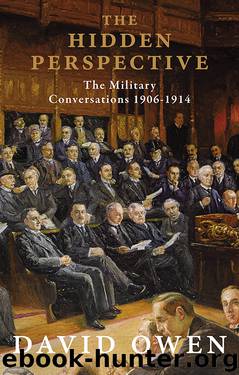The Hidden Perspective by Owen David;

Author:Owen, David;
Language: eng
Format: epub
ISBN: 9781908323675
Publisher: Haus Publishing
Published: 2014-10-17T16:00:00+00:00
In February 1912 the Secretary of State for War, Lord Haldane, went to Germany for new discussions regarding a British-German agreement. The optimists intended to stop the Germans increasing their naval resources, thus giving Britain naval superiority. The realists were ready to settle for an appreciable slowing. In return Britain was to try to facilitate some of Germany’s colonial territory-building demands. The core aim was to avert war. Had by then a preventative strategy for war breaking out or for negotiating a ceasefire through maritime blockades by the Royal Navy been in place, the Germans would likely have been more flexible in the talks. Although apprehensive about the process, Grey had accepted that a fresh attempt should be made to reach an agreement with Germany but, sadly, according to Robbins, ‘As a diplomatic exercise it was to prove a vindication of Grey’s linguistic intransigence and cultural insularity’.1
The background to the Haldane Mission is that Harcourt, the Colonial Secretary, had written in September 1911, ‘The idea of war is monstrous and inconceivable − and if it took place it would involve the whole of Europe.’ By December, a proposal for further discussions with Germany had begun to take shape and privately Harcourt was stating that Anglo-German relations could be permanently improved if there were conversations concerning territory, which might give Germany what Asquith called in the House of Commons ‘a place in the sun’, without injury to Britain’s colonial or imperial interests. If anything, Harcourt thought that a deal should be to the definite advantage of Germany.
Harcourt’s search for a solution was premised on the belief that pushing Germany to reduce naval expenditure was not enough, there had to be a political carrot; and he saw an opportunity over Portugal. Great Britain’s position on Portugal was defined by two secret agreements, one made with Germany in 1898 and one with Portugal in 1899. The former regulated the partition of Portuguese colonies in the event that Portugal collapsed economically and/or politically; the latter confirmed Portugal as the oldest ally of Great Britain and committed Britain to defend its colonies: an inconsistency that would become immediately obvious if the agreements were ever to become public.2
In late December 1911, Grey wrote privately from Fallodon to Sir Edward Goschen, the British Ambassador in Berlin. As was often the case with Grey, the analysis was excellent and he did not pull any punches over the Portuguese colonies, but the inner steel to take risks was still lacking. To make a deal with Germany it was necessary to put a check on the dominant relationship with France and put economic and moral pressure on Portugal to sell some of its colonies to Germany, and to find other areas, particularly financial help, where Great Britain could ease the political problems for Portugal. This is what Grey wrote to Goschen:
Download
This site does not store any files on its server. We only index and link to content provided by other sites. Please contact the content providers to delete copyright contents if any and email us, we'll remove relevant links or contents immediately.
| Automotive | Engineering |
| Transportation |
Whiskies Galore by Ian Buxton(41529)
Introduction to Aircraft Design (Cambridge Aerospace Series) by John P. Fielding(32888)
Small Unmanned Fixed-wing Aircraft Design by Andrew J. Keane Andras Sobester James P. Scanlan & András Sóbester & James P. Scanlan(32573)
Craft Beer for the Homebrewer by Michael Agnew(17933)
Turbulence by E. J. Noyes(7700)
The Complete Stick Figure Physics Tutorials by Allen Sarah(7138)
Kaplan MCAT General Chemistry Review by Kaplan(6595)
The Thirst by Nesbo Jo(6435)
Bad Blood by John Carreyrou(6274)
Modelling of Convective Heat and Mass Transfer in Rotating Flows by Igor V. Shevchuk(6222)
Learning SQL by Alan Beaulieu(6035)
Weapons of Math Destruction by Cathy O'Neil(5829)
Man-made Catastrophes and Risk Information Concealment by Dmitry Chernov & Didier Sornette(5646)
Digital Minimalism by Cal Newport;(5389)
Life 3.0: Being Human in the Age of Artificial Intelligence by Tegmark Max(5184)
iGen by Jean M. Twenge(5161)
Secrets of Antigravity Propulsion: Tesla, UFOs, and Classified Aerospace Technology by Ph.D. Paul A. Laviolette(4990)
Design of Trajectory Optimization Approach for Space Maneuver Vehicle Skip Entry Problems by Runqi Chai & Al Savvaris & Antonios Tsourdos & Senchun Chai(4839)
Electronic Devices & Circuits by Jacob Millman & Christos C. Halkias(4748)
